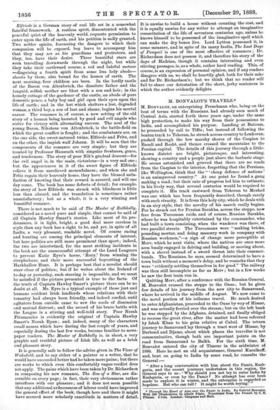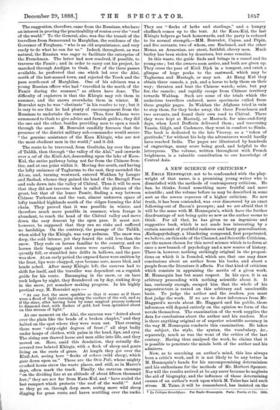M. BONVALOT'S TRAVELS.* M. BONVALOT, an enterprising Frenchman who, being
on the best of terms with the Russians, had already seen much of Central Asia, started forth three years ago, under the same high protection, to make his way from their possessions to India, and accomplished his purpose. Landing at Batonm, he proceeded by rail to Tiflis; but instead of following the beaten track to Teheran, he struck across country to Lenkoran, pushed through the low marshy shores of the Caspian to Enzeli and Resht, and thence crossed the mountains to the Persian capital. The details of this journey through a little- known district are bright, picturesque, and interesting, showing a country and a people just above the barbaric stage. He seems astonished and grieved that there are no roads from the Caspian to the interior, forgetting that the Persians, like Wellington, think that the "cheap defence of nations' is an unimproved country." At one point he found a gang making a road; but their rate of progress led him to estimate,
in his lively way, that several centuries would be required to complete it. His track eastward from Teheran to Meshed was one which has been frequently described, though rarely with such vivacity. It is from this holy city, which he deals with in an airy style, that the novelty of his march really begins. For he struck out for Persian Sarakhs, across the steppe, now free from Tureoman raids, and of course, Russian Sarakhs, where he was hospitably entertained by the commander, who
had built a town consisting, when the wanderer was there, of two parallel streets. The Trocomans were "making bricks, pounding mortar, and doing masonry work in company with Russian workmen,"—a sign of change more perceptible at Merv, which he next visits, where the natives are once more seen busily engaged in delving and building, or moving about, with a shovel instead of a sword thrust into their cummer- bunds. The Russians, he says, seemed determined to have a town built without a moment's delay, and he remarks that they were "evidently settling themselves in for good." The railway was then still incomplete as far as Mery ; but in a few weeks he saw the first train run in.
Quitting Merv, after a conference with the Russian General, Bonvalot crossed the steppe to the Oxus ; but he gives few details of his journey from the new city to Samarcand, where he arrived in the middle of August. We now come to the novel portion of his toilsome traveL He much desired to enter Afghanistan, proceeded to the Oxus by way of Hissar, and was actually ferried over the stream ; but on the left bank he was stopped by the Afghans, detained, and finally obliged to recross the great river, after the matter had been referred by Ishak Khan to his grim relative at CabuL The return journey to Samarcand lay through a tract west of Hissar, by Derbend and Djame, about which places the traveller is not communicative, though both are important points on the road from Samarcand to Balkh. For the sixth time, M.
Bonvalot entered the city of Timour in the midwinter of 1886. Here he met an old acquaintance, General Karalkoff, and, bent on going to India by some road, he consults the General :—
"After a long conversation with him about the Pamir' , Kash- garia,, and the recent journeys 'undertaken in this region, the General says to : 'Why should you not try to enter India by Bashgaria, or even by the Pamir ? No attempt has ever been made to explore it in winter, and the enterprise is regarded as hopeless. But who can tell ? It might be worth trying.' " • Through the Heart of Asia, over the Pamir to India. By Gabriel Bonvalot. With 250 Illustrations by Albert Pdpin. Translated from the French by C. B. Pitman. 2 vols. London: Chapman and Hall.
The suggestion, therefore, came from the Russians, who have an interest in proving the practicability of routes over the "roof of the world." To the General, also, was due the transit of the travellers from Samarcand to Marghilan, the residence of the Governor of Ferghana, "who is an old acquaintance, and very ready to do what he can for us." Indeed, throughout, as was natural, the Russian was eager to facilitate the enterprise of the Frenchman. The latter had now resolved, if possible, to traverse the Pamir ; and in order to carry out his project, he marched through Andijan to Oosh. For of the three passes available, he preferred that one which led over the Alai, south of the last-named town, and rejected the Terek and the pass south-east of Marghilan. One of his advisers was a young Russian officer who had "travelled in the north of the Pamir during the summer," as others have done. The difficulty of explorers is that the Khirgiz may rob them in summer, and the snows overwhelm them in winter. M. Bonvalot says he was " obstinate " in his resolve to try ; but it is easy to see that he had plenty of encouragement from the Russians to undertake the venture. Thus, four Khans were summoned to Oosh to give advice and furnish guides; they did the one and the other, besides providing men to open a track through the snow. M. Bonvalot candidly foresees that the presence of the district military sub-commander would secure "the genuine assistance of the Kara Khirgiz, who are not the most obedient men in the world ;" and it did.
The route to be traversed, from Gotiltcha, lay over the pass
of Taldik, then through "the valley of the Alai," and onwards over a co/ of the Kizil-Art, descending upon the lake of Kara- Kul, the entire pathway being not far from the Chinese fron-
tier, and at one point within it. Moving due south, and having the lofty eminence of Tagharma to the east, they ascended the Ak-su, and, turning westward, entered Waklaan by Langar and Sarhad, whence they gained the head of the Barogil Pass and rode down into the valley of Chitral. Thus it will be seen that they did not traverse what is called the plateau of the great, but that of the lesser Pamir, finding a way between Chinese Turkestan and the vast, almost unknown space of lofty tumbled highlands south of the ridges forming the Alai chain. They proved that it was possible in winter, and therefore much more possible in summer, when forage is abundant, to reach the head of the Chitral valley and move down the easy descent by the open pass. It must not, however, be supposed that they ran no risks and suffered no hardships. On the contrary, the passage of the Taldik, when aided by the Khirgiz, was very arduous. The snow was deep, the cold intense, yet they feared the cold less than the snow. They rode on horses familiar to the country, and on horses their baggage and stores were carried. These fre- quently fell, or stumbled into drifts in hollows, and the pace was slow. At an early period the exposed fazes were smitten by the frost, lips were chapped, eyes became sore, noses bled, and heads ached. After many Khirgiz left, the caravan had to shift for itself, and the traveller was dependent on a roguish guide for his route. Encamping in the snow, or on bare rock ledges by night, they floundered on by day, sinking deep in the snow, yet somehow making progress. In his highly poetical way, M. Bonvalot says :— "At our feet the snow sparkles so that it seems as if there were a flood of light running along the surface of the soil, and as if the stars, after having been by some magical process reduced to diamond dust, with flashes of gold, had been sprinkled about on this stream of light."
At one moment on the Alai, the caravan was "dotted about over the plain like the beads of a broken chaplet," and they halted on the spot where they were worn out. That evening there were "sixty-eight degrees of frost ;" all slept badly under heaps of clothes, with pains in the head, lips, and eyes. The rising sun thawed horse and man alike into life, and they moved on. Here, amid this desolation, they actually dis- covered two belated Khirgiz, with a flock of sheep and goats
living on the roots of grass. At length they got over the Kizil-Art, seeing here "flocks of arkars (wild sheep), which gaze down upon us." These are the Ovis Poli, whose mighty
crooked horns strew the waste places, and still, as in Marco's days, often mark the track. Finally, the caravan encamps "on the dividing line at an altitude of about fifteen thousand 'feet ;" they are not far from Kara-Kul, and "have scaled the last rampart which protects the roof of the world." And so they go on, through deep snow, seeing more wild sheep digging for grass roots, and hares scuttling over the rocks. They see "flocks of larks and starlings," and a hungry chaffinch comes up to the tent. At the Kara-Kul, the last Khirgiz helpers go back homewards, and the party is reduced to its normal strength,—MM. Bonvalot, Capns, and Pepin, and five servants, two of whom, one Rachmed, and the other Menas, an Armenian, are stout, faithful, cheery men. Much barley has been stolen by deserters, but some remains.
In this waste, the guide finds and brings in a camel and its young one ; but the owners soon arrive, and both are given up. They cross the pass of Kizil Djek in a tempest, and catch a glimpse of huge peaks to the eastward, which may be Tagharma and lltiustagh, or may not. At Rang Kul they obtain three camels, a yak, and a horse to help them on their way; threaten and beat the Chinese watch; seize, but pay for, the camels ; and rapidly escape from Chinese territory towards Wakhan. Such are some of the trials which the audacious travellers endured, mere specimens culled from these graphic pages. In Wakhan the Afghans tried in vain to stop them, for they broke away, the three Frenchmen and two servants, and found their own road to Chitral. There they were kept at Mastudj, or Mastuch, for nine-and-forty days, when Lord Dufferin delivered them ; and traversing Yassin, Gilgit, and Cashmere, they went in comfort to Simla. The book is dedicated to the late Viceroy, as a "token of gratitude," for without his help the adventurers would hardly have reached India. The pages are illustrated by hundreds of engravings, many score being good, and helpful to the letterpress. The volume, written throughout with French brightness, is a valuable contribution to our knowledge of Central Asia.



































 Previous page
Previous page